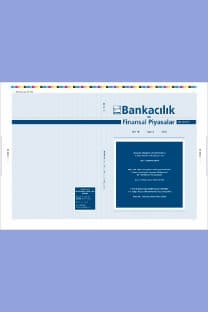Prudential Regulation and Supervision of the Banking Sector and Banking Crises: A Cross Country Empiricial Investigation
Bankacılık Sektörü Düzenlemesi ve Denetlemesi ile Bankacılık Krizleri: Ülke Bazında Ampirik Sınama
___
- 1. Akyüz Y. (1993). Financial Liberalization: The Key Issues. UNCTAD Discussion Paper, UNCTAD/OSG/DP/56.
- 2. Alper C.E. and Öniş Z. (2002). Soft Budget Constraints, Government Ownership of Banks and Regulatory Failure: The Political Economy of the Turkish Banking System in the Post-Capital Account Liberalization Era. Bo¤aziçi University Department of Economic Working Paper, ISS/EC.
- 3. Barth J., Caprio G. and Levine R. (1999a). Banking Systems Around the Globe: Do Regulation and Ownership Affect Performance and Stability?. paper prepared for the NBER Conference on Prudential Supervision: What Works and What Doesn’t, January 13-15, 2000, Islamorada, Florida.
- 4. Barth J., Caprio G. and Levine R. (1999b). Financial Regulation and Performance: Cross-Country Evidence. The World Bank Policy Research Working Paper, No:2037, The World Bank
- 5. Barth J., Caprio G. and Levine R. (2001). The Regulation and Supervision of Banks Around the World: A New Database. The World Bank Policy Research Working Paper, No:2588, The World Bank
- 6. Barth J., Caprio G. and Levine R. (2002). Banking Regulation and Supervision: What Works Best?. NBER Working Paper, No: 9323, Cambridge, Massachusetts
- 7. Caprio G. and D. Klingebiel (2003). Episodes of Systemic and Borderline Financial Crises. The World Bank
- 8. Corbett J., Irwin G. and Vines D. (1999). From Asian Miracle to Asian Crisis: Why vulnerability, Why Collapse?. http://www.rba.gov.au/PublicationsAndResearch/ Conferences/1999/CorbettIrwinVines.pdf
- 9. Demirgüç-Kunt A. and Detragiache E. (1998). Financial Liberalization and Financial Fragility. The World Bank Policy Research Working Paper, No: 1917, The World Bank
- 10. Demirgüç-Kunt, A. and Detragiache E. (2000). Does Deposit Insurance Increase Banking System Stability?. IMF Working Paper, No:00/3.
- 11. Dornbusch, R. (1998). Capital Controls: An Idea Whose Time is Past. in Should the IMF Pursue Capital Account Convertibility. Princeton Essays in International Finance, No. 207.
- 12. Edwards, S. (2000). Capital Mobility and Economic Performance: Are Emerging Economies Different?. UCLA Working Paper
- 13. Fischer B. and Reisen H. (1992). Towards Capital Account Convertibility. OECD Development Centre Policy Brief, No.4.
- 14. Fischer S. (1998). Capital Account Liberalization and the Role of the IMF. in Should the IMF Pursue Capital Account Convertibility?, Princeton Essays in International Finance, No.207
- 15. Intal, P.S., Pontines V. and Monija J. (2001). Financial Liberalization and Integration in the APEC Region: Performance and Comparison with Chile and the European Union. Philippine APEC Study Center Network Discussion Paper, No. 2001-06.
- 16. Johnston B. (1998). Sequencing Capital Account Liberalizations and Financial Sector Reform. IMF Paper on Policy Analysis and Assessment, PPAA/98/8.
- 17. Johnston, B., Darbar S. and Echeverria C. (1997). Sequencing Capital Account Liberalization: Lessons from the Experiences in Chile, Indonesia, Korea and Thailand. IMF Working Paper, WP/97/157
- 18. Mathieson D. and Rojas-Suarez L. (1994). Capital Controls and Capital Account Liberalization. in (eds.) L. Leiderman and A. Razin, Capital Mobility: The Impact on Consumption, Investment and Growth, Cambridge University Press, Cambridge.
- 19. McKinnon, R. (1998). Beware the Overborrowing Syndrome. in United Nations Development Programme (UNDP)
- 20. Mehrez G. and Kaufmann D. (2000). Transparency, Liberalization and Banking Crisis. The World Bank Policy Research Working Paper Series, No: 2286, the World Bank
- 21. Mishkin F. (2001). Financial Policies and the Prevention of Financial Crises in Emerging Market Countries. NBER Working Papers, No:8087, National Bureau of Economic Research, Inc.
- 22. Neyaptı, B. and N. Dinçer. (2005a). Measuring the Quality of Bank Regulation and Supervision, with an Application to Transition Economies, Economic Inquiry, No:43, pp.79-99.
- 23. Neyaptı, B. and N. Dinçer. (2005b). Legal Quality of Bank Regulation and Supervision and its Determinants: A Mixed Sample, Bilkent University Discussion Paper, No: 05-03, http://www.bilkent.edu.tr/~economics/papers/05-03%20DP_Neyapti_Dincer.pdf
- 24. Noy I. (2004). Financial Liberalization, Prudential Supervision and the Onset of Banking Crises. Emerging Markets Review, No:5, pp. 341-359.
- 25. Rossi M. (1999). Financial Fragility and Economic Performance in Developing Countries: Do Capital Controls, Prudential Regulation and Supervision Matter?. IMF Working Paper, WP/99/66.
- 26. Williamson J. (1999). Whether and When to Liberalize Capital Account and Financial Services. Staff Working Paper ERAD 99-3, World Trade Organization.
- 27. Williamson J. and Mahar M. (1998). A Survey of Financial Liberalization. Princeton Essays in International Finance, No.211
- ISSN: 1307-5705
- Yayın Aralığı: 2
- Başlangıç: 2007
- Yayıncı: Bankacılık Düzenleme ve Denetleme Kurumu
Gelişmekte Olan Hisse Senedi Piyasalarının Piyasa Verilerine Göre Gruplanması
RAMAZAN AKTAŞ, M. Mete DOĞANAY
An Aggregated Information Technology Checklist for Operational Risk Management
Operasyonel Risk Yönetimi için Bütünleştirilmiş Bilgi Teknolojileri Kontrol Listesi
Testing Quantity Theory of Money for the Turkish Economy
Müşterilerin İpotekli Konut Kredisi Taleplerini Nicel Değerlendirme Modeli Önerisi
